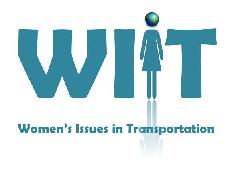 |
5ème Conférence Internationale sur les Femmes et le Transport - Construire les ponts
14-16 avr. 2014 Paris - La Défense (France)
|
Programme Scientifique > Appel à communicationABSTRACT FOR NOVEMBER, 20 2012 5th International Conference on Women's Issues in Transportation "THE venue to present and share research findings on gender and transport with colleagues from all over the world" Avril 2014 The first four Conferences on Women's Issues in Transportation (WIiT) were held in the US, starting in 1978. Beginning with primarily a scholarly focus, the series has broadened its outlook into policy making issues and planning and engineering processes, gradually deepening the understanding of women's issues at local, regional, state and national levels. The 4th conference in 2009 adopted an international perspective and sought to address long standing issues related to gender concerns in transportation including personal safety and security, and highlighting changing demographics, the latest findings on crash and injury prevention for different segments of the female population, and the impacts of extreme events. The two volumes of Proceedings, constituting a substantial contribution to the body of literature on gender issues, can be accessed as follows: The Transportation Research Board's Women's Issues in Transportation. Volume 1: Conference Overview and Plenary Papers http://www.trb.org/Main/Blurbs/164708.aspx; Volume 2: Technical Papers. Summary of the 4th International Conference http://www.trb.org/Main/Blurbs/165294.aspx. The 5th WIT Conference focuses on the general question of "bridging the gap" between men and women in matters related to Transportation. The conference will provide an international forum for sharing the latest research findings and policy analyses, and will feature international officials, keynote speakers, researchers, and practitioners. Building on the past four decades of research on women's transportation issues, a major aim is to expand the international outlook. Another goal is to deepen understanding of women not just as passive recipients of transport services, but as actors in sustainable access and safe mobility research, policy development, governance and oversight, service delivery and business expansion. The identification of future research needs will also be a major area of attention. The focus areas are: transport policy, transport patterns and mobility; health, safety and personal security; sustainability; and careers in transportation and transport sector professionals. In addition three cross-cutting themes will be considered: gender research issues; issues related to converting research findings into to policy; and issues pertaining to narrowing the gap between developed countries and developing countries with respect to women's issues in transportation. The Conference Planning and scientific Committees invite abstracts for papers that address one or more of these four focus areas or cross-cutting themes. Politique de transport, déplacement et mobilité
This Pillar refers to the gender impact of transport policies and regulatory frameworks, as they frame the sector research, investment and service delivery. Understanding transport patterns and mobility is fundamental to the creation of evidence-based, gender-sensitive policies. Women’s socio economic conditions, mobility patterns and special needs vary widely across and within countries. Appropriate knowledge, monitoring and evaluation, incentives, regulations, and remedies are core elements of gender-sensitive transport policies, equally serving women and men. Ideally, policies should be designed to provide an enabling environment for a fair share of the mobility benefit and of the sector wealth participation between women and men. The design and implementation of successful policies would benefit greatly from sharing the experiences of countries across the globe. Santé, sécurité et sûreté de la personne
Key question of this pillar relates to gendering of transport safety, health and security issues, policy making and gaps between low, medium and high income countries. Papers are expected on influence of gender on type of crashes women and men are involved in, type of injuries they are confronted with, consequences of transport on their health and well-being, attitudes and behaviors they have concerning transport safety and security. On these different topics, papers could also analyze if and how can policies concerning safety, security and health take gender differences and specificities into account. Furthermore, papers are expected on cultural, economic and geographical effects on gender safety, security and health on transportation. In particular, papers dealing with transfer possibilities and issues of best practices concerning gender equalities in safety, security and health in transportation from one country to another are welcome. Mobilité durable
The three pillars of sustainability relate to economic, societal, and environmental considerations. Further, while one country may be working to make their transportation more environmentally sustainable, another may need to prioritize economic or social sustainability. As well, changes to the built environment (land-use and transportation infrastructure) to improve one aspect may negatively affect another. Within those three areas is an enormous set of issues that could affect the genders differently; this research pillar requests work on such important topics. Impact de la mobilité sur l'activité professionnelle et impact de l'activité professionnelle sur la mobilité
Work and mobility co-exist and overlap at different scales which can be classified as follows: 1/ Nearly everyone commuting in order to go to work in the morning and coming back home in the evening; 2/ An increasing part of the working population who are mobile professionals, that means they have to move during their work because their activity has to be carried out in variable places for "Customers"; 3/ Transport professionals who are working in itinerant ore sedentary jobs producing mobility for people or goods. Women's specificity related to work and occupation has been described on many occasions. All these issues can be found questioning professional activities (or any wealth creating activity) in relationship with transport and mobility. They are obvious when jobs are overwhelmingly dominated by men. For conference information or information on becoming a conference sponsor and for questions concerning the call for abstracts should be directed to wiit-paris2014@listes.ifsttar.fr |
| Personnes connectées : 1 | Flux RSS |

|
